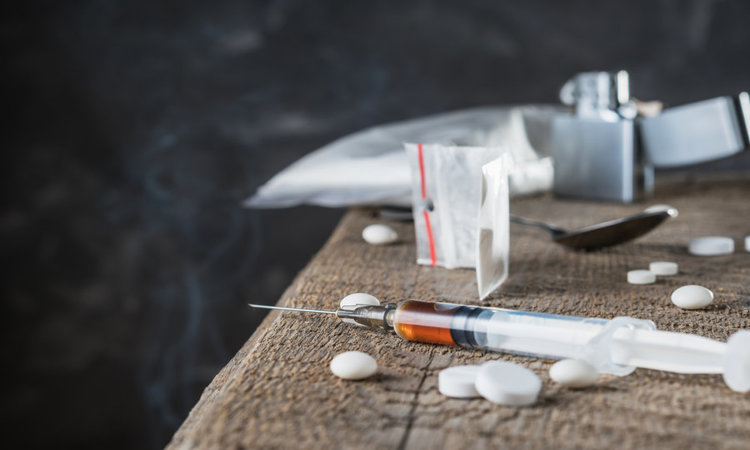
Is Heroin a Stimulant? – No, heroin is not a stimulant. Heroin belongs to a drug class known as opioids that interact with corresponding receptors in the brain and tend to have sedating, relaxing, and depressant effects. They reduce activity in the brain and body, as well as relieve pain and may induce intense feelings of euphoria.
Conversely, stimulants boost activity in the brain. They may also produce euphoric feelings, but rather than experiencing a sedating effect, users report feeling a surge of energy, wakefulness, and alertness.
How is Heroin Used?
Heroin is usually found as a white or off-white powder but can also come in the form of a less pure tar-like substance known as black tar heroin. Heroin is often injected into a vein, but it can also be smoked (‘chasing the dragon’) and added to cigarettes and cannabis.
Short-Term Effects of Heroin
Heroin’s effects are almost immediate if it is injected intravenously. In contrast, it may take between 10 to 15 minutes for effects to appear if snorted. Note that, no matter the route of administration, there are no safe levels of heroin use, and all heroin use is risky and potentially lethal because it is often laced with other drugs and harmful chemicals.
The effects of heroin vary between individuals based on several factors, including the following:
- The person’s height and weight
- The person’s overall health and metabolism
- The person’s tolerance level
- The presence of other drugs in the body
- The dose consumed
- The purity and potency of the heroin
Once heroin is consumed, the effects typically last between 3 to 5 hours, and include the following:
- Pain relief
- Intense pleasure (euphoria)
- Relaxation and drowsiness
- Dry mouth
- Pinpoint pupils
- Decreased libido
- Suppressed appetite
- Confusion and clumsiness
- Slurred speech
- Slowed breathing and heart rate
- Nausea and vomiting
Heroin is most commonly injected intravenously using needles. In cases where needles are shared between multiple people without being sterilized in between uses, there is a dramatically increased risk of the following:
- Hepatitis B and C
- Tetanus
- Vein damage
- Infection
- HIV and AIDS
Long-term Effects of Heroin
According to the National Institute on Drug Abuse (NIDA), “repeated heroin use changes the physical structure and physiology of the brain, creating long-term imbalances in neuronal and hormonal systems that are not easily reversed. Studies have shown some deterioration of the brain’s white matter due to heroin use, which may affect decision-making abilities, the ability to regulate behavior, and responses to stressful situations. Heroin also produces profound degrees of tolerance and physical dependence.”
Regular heroin use may also eventually lead to the following:
- Bouts of intense sadness
- Irregular menstrual cycles
- Difficulty conceiving children
- No libido
- Chronic constipation
- Damage to the liver, lungs, heart, and brain
- Damage to the veins, skin
- Heart and lung infections from injecting
- Increased tolerance
- Financial, work, and social problems
Heroin Overdose
Heroin users can overdose if they consume a sufficiently large amount or encounter a particularly potent batch or a batch laced with an even stronger drug, like fentanyl. If you or a loved one is exhibiting any of the following symptoms after consuming heroin, contact emergency medical help right away:
- Difficulty concentrating
- Trouble staying awake, or “nodding out”
- Difficulty urinating
- Itchiness
- Irregular heartbeat or palpitations
- Cold and clammy skin
- Dangerously slowed respiration rate
- Bluing of the lips and fingertips (cyanosis)
- Loss of consciousness
Naloxone, or Narcan®, is an opioid antagonist that detaches heroin from opioid receptors, thereby preventing or reversing an overdose. Fortunately, naloxone is carried by nearly all first responders and can be acquired over-the-counter without a prescription at most major pharmacies in the United States.
Heroin Withdrawal
Heroin is notoriously difficult to stop using because the body rapidly becomes dependent on its presence in order to function normally. Once the body is dependent, if the user attempts to quit or cut back their heroin use, highly unpleasant withdrawal symptoms will occur. Such symptoms usually start within 6 to 24 hours after the last consumed dose and may last for a week or more – the first one to three days are by far the worst.
Heroin withdrawal symptoms include the following:
- Intense cravings for more heroin
- Restlessness and irritability
- Runny nose
- Diarrhea
- Depression and uncontrollable crying
- Insomnia and frequent yawning
- Stomach aches and leg cramps
- Goosebumps
- Lack of appetite
- Nausea and vomiting
- Rapid heartbeat
Treatment for Heroin Addiction
Heroin addiction is a devastating and potentially fatal condition that adversely impacts the lives of those suffering as well as loved ones. If you or someone you know is addicted to heroin, it is imperative that you seek treatment as soon as possible. Although not curable, heroin dependence is treatable, and people can and have successfully recovered and went on to enjoy long-lasting sobriety and happy, fulfilling lives.
Research has shown that the best outcomes are achieved when patients undergo a medical detox followed by long-term inpatient or intensive outpatient treatment and aftercare. The programs should encompass a comprehensive approach using evidence-based modalities such as psychotherapy, psychoeducation, counseling, and group support.
Our center employs certified medical professionals who specialize in addiction and administer these services with compassion. We can help restore sanity to your life and get you started on the path to long lasting recovery.
Please do not suffer another day. Call us now to find out how we can help!